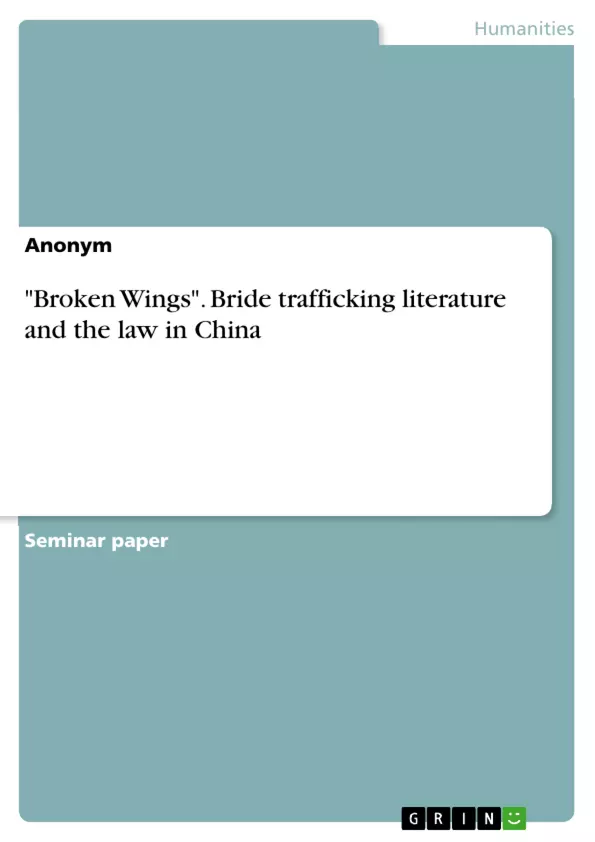This paper explores the issue of bride trafficking in China, focusing on the interplay between literature and the legal system. Through an analysis of Jia Pingwa’s novel "Broken Wings," the study examines the social and legal challenges faced by trafficked women in China. The text delves into the demographic imbalances and cultural practices that contribute to the prevalence of bride trafficking, highlighting the lack of effective legal protections for victims. By juxtaposing literary representation with real-world incidents, such as the viral TikTok video of a chained woman, the paper underscores the brutal realities of trafficking and the systemic failures in addressing these crimes. The analysis reveals how literature not only reflects but also influences societal attitudes towards gender and trafficking. The study critiques the inadequacies in the Chinese legal system, advocating for stronger penalties and better enforcement to protect victims. Ultimately, the paper calls for comprehensive social and legal reforms to address the deep-rooted issues of gender inequality and human trafficking.
Inhaltsverzeichnis (Table of Contents)
- Introduction
- Broken Wings: a story of bride trafficking
- Behind the story: trafficked women and forced marriage in China
- Literature, Law and Social Change
- Conclusion
Zielsetzung und Themenschwerpunkte (Objectives and Key Themes)
This essay aims to explore the social background of bride trafficking and the anti-trafficking legal system in China through the analysis of the book Broken Wings by Jia Pingwa. It also emphasizes the referential significance bride trafficking literature has to the development of the legal system. The essay then examines whether Broken Wings glorifies crime and exposes the injustices of the system and the dominating patriarchal ideology.
- Bride Trafficking in China
- Social and Legal Context of Bride Trafficking
- The Role of Literature in Addressing Social Issues
- The Intersection of Law, Literature, and Gender
- The Impact of Patriarchy and Social Norms
Zusammenfassung der Kapitel (Chapter Summaries)
- The Introduction establishes the problem of bride trafficking in China and its historical context. It highlights the increasing demographic imbalances and the lack of effective protections, leading to a burgeoning trade in women and underage girls for marriage.
- The second chapter focuses on the novel Broken Wings by Jia Pingwa. The chapter explores the story of Hu Die, a young woman who is kidnapped and sold as a bride in a rural village. This chapter delves into the story's themes of exploitation, violence, and resistance.
- The third chapter examines the broader context of bride trafficking in China. It discusses the social and legal factors that contribute to this phenomenon, including the gender imbalance and the lack of enforcement of anti-trafficking laws.
- The fourth chapter delves into the relationship between literature, law, and social change. It examines how literature can raise awareness of social problems and influence public opinion.
Schlüsselwörter (Keywords)
Bride trafficking, China, Jia Pingwa, Broken Wings, gender, law, social change, human rights, exploitation, violence, patriarchal ideology, legal system, literature, social commentary.
- Quote paper
- Anonym (Author), 2022, "Broken Wings". Bride trafficking literature and the law in China, Munich, GRIN Verlag, https://www.hausarbeiten.de/document/1485144


